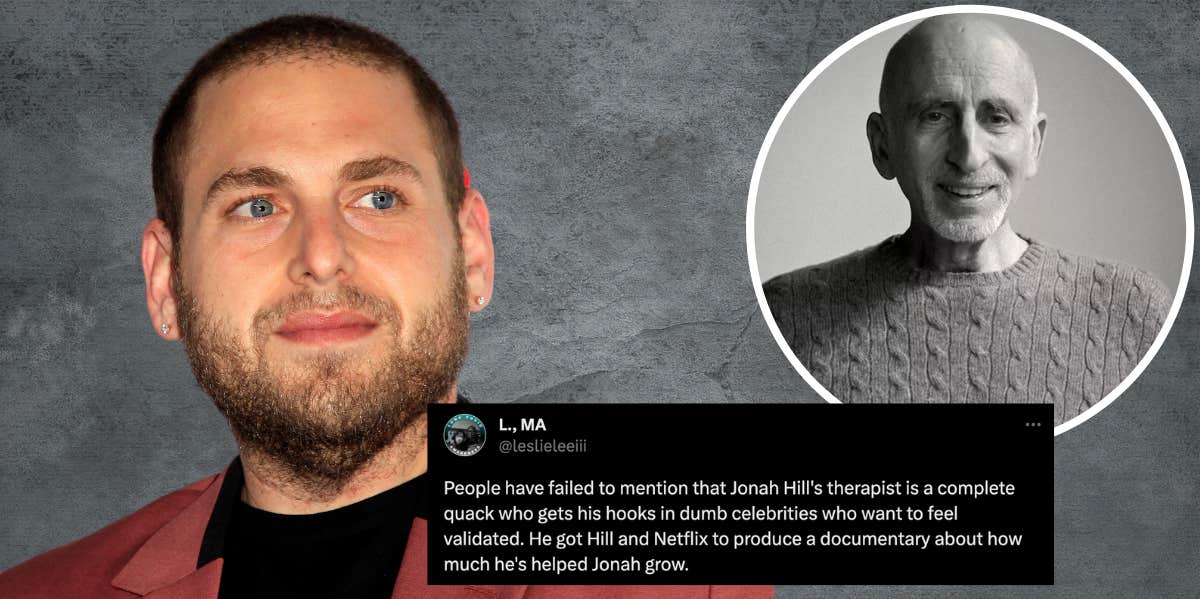Psychologist Warned About Jonah Hill's Therapist's Methods Months Ago & Many Think He's To Blame For The Sarah Brady Texts
Is Hill's therapist, Phil Stutz, to blame for the actor's emotional abuse toward Sarah Brady?
 Kathy Hutchins / Shutterstock; Twitter; Netflix; NoName_13 from pixabay via Canva Pro
Kathy Hutchins / Shutterstock; Twitter; Netflix; NoName_13 from pixabay via Canva Pro As Jonah Hill's ex-girlfriend continues to share more text exchanges between her and Hill, further accusing him of being emotionally abusive, many people are starting to realize that Hill's therapist may be the problem.
Over the last week, professional surfer and model Sarah Brady posted a series of alleged text messages between her and Hill, where the "21 Jump Street" actor used so-called therapy speak to have control over Brady's life and dictate the type of "boundaries" that he needs in a romantic relationship.
While many people on social media have been quick to call out Hill for the wrong use of the word "boundaries," and that it's just a display of coercive control, others have started to look toward Hill's psychiatrist, Phil Stutz, whom the actor had been seeing for years.
Jonah Hill's psychiatrist's methods were called into question months prior by a psychologist.
In November 2022, Hill released a documentary titled "Stutz," which consisted of candid conversations between Hill and his 75-year-old psychiatrist, Phil Stutz.
While the film delves into Stutz's life and therapy practices, Hill also opened up about his own struggles, including his mental health, the sudden passing of his brother in 2017, and the trauma surrounding his weight. The film was applauded by many of Hill's fans, but some fellow psychologists felt that Stutz's methods were both unprofessional and troubling.
In an interview with Vice following the release of the documentary, James Davies, a qualified psychotherapist, was asked if he believed Stutz was a "good therapist."
"From the standpoint of some measures, Stutz rejects much that’s associated with good therapeutic work — maintaining boundaries, not giving advice, and not relying on untested theories," Davies told the publication.
When asked how Stutz's practices differ from a standard therapist that people might see, Davies pointed out that many of the A-list clients that approach Stutz believe that he will grant them "special access to 'higher universal forces' so long as they apply his tools unquestioningly."
"What distinguishes this approach from work in clinical psychology is that it’s totally divorced from any scientific evidence base. In the place of evidence, we have faith. In the place of research-led practice, we have charismatic leadership," Davies continued.
"If or when his approach ‘works,’ I suspect it has less to do with the reasons he gives — the tools bringing you closer to the universal force — and more to do with his approach appealing to ‘common factors,’ as we call them in psychology."
There's also the issue of how close Hill and Stutz really are. Their bond seems to transcend the usual therapist/client relationship, and the two have seemed to form a close friendship, which can be problematic when realizing what Hill and Stutz's relationship was supposed to be from the beginning.
Hill's personal relationship with his therapist, Phil Stutz, can be seen as unprofessional.
In a TikTok video, a mental health professional, Elle, gave her insight into Hill's documentary and the relationship that the actor has with Stutz.
"They are the sort of people who would think it's a really great idea to take their deepest, darkest moments with their therapist and monetize it," Elle pointed out. "I really saw something straight away that concerned me, firstly that there was this no confidentiality, there was this countertransference, there was this far too personal relationship between these two people."
Elle explained that if she spent her time as a therapist only talking about her own experiences and struggles, it would do nothing but minimize the experiences of the other person who had sought out therapy.
"Next thing on top of that was the use of the fact that it was only a rich white dude going to see a rich white therapist to talk about rich white [people's issues]," she continued. Elle also noted that the type of therapy Hill and Stutz had done in the documentary, which was talk therapy, isn't as effective as other forms, such as semantics.
She claimed that while the outcome of Hill's documentary was productive, including bringing attention to men being more open about going to therapy and talking about their feelings, there seemed to be a lack of accountability on Hill's part and Stutz's part when it came to acknowledging the actor's privileges.
Hill's decision to make a documentary with Stutz could've been the actor's way of successfully showing that he had "conquered therapy," and gotten all of the tools he needed from Stutz to evolve into a healthier individual emotionally.
However, if a person goes into therapy with the mindset that they will eventually be "completely healed," they've failed to come to terms with the fact that dealing with mental health issues isn't something that will suddenly ever stop being hard.
Nia Tipton is a Chicago-based entertainment, news, and lifestyle writer whose work delves into modern-day issues and experiences.

